
There are different types of iron ore in nature, mainly divided into magnetite, hematite, limonite, siderite, ilmenite and chromite. The mineral processing technology adopted by different types of ores are of course very different. The following will introduce the different beneficiation technologies of the above three kinds of iron ores.
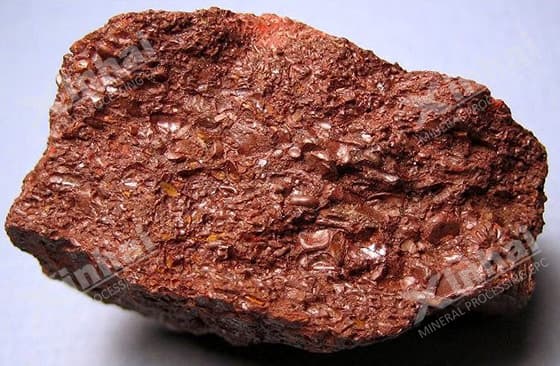
The types of magnetite include single magnetite, vanadium-titanium magnetite, mixed ore and polymetallic symbiotic ore. Magnetite is a strong magnetic mineral, and weak magnetic separation process is often used in mineral processing. Magnetite ore separation process mainly includes: single weak magnetic separation process, first weak magnetic separation-then reverse flotation process, first weak magnetic field-then strong magnetic field- Re-flotation joint process.
(1) Single weak magnetic separation process
This process can be divided into two processes: first continuous grinding - then weak magnetic separation process, stage grinding - stage separation process, mainly suitable for magnetite ore with simple ore composition.
①Continuous grinding-weak magnetic separation process: according to the particle size of ore embedding, one-stage grinding or two-stage continuous grinding process is selected, and the ore that meets the grinding product standard enters the magnetic separator for weak magnetic separation. This process is used to process magnetite ore with coarse particle size or high iron content.
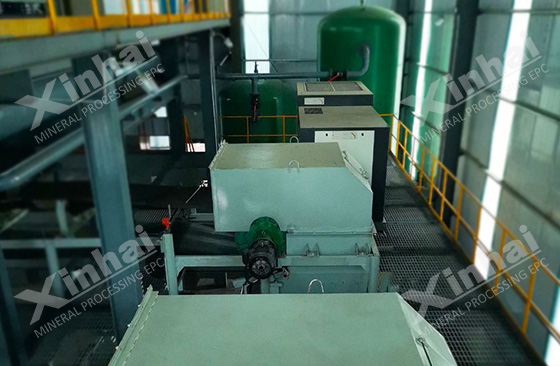
②Stage grinding-stage magnetic separation process: this process is used to process low-grade magnetite with fine particle size. The products of the first stage of grinding are subjected to magnetic separation roughing, and some qualified tailings are thrown away. The rougher concentrate enters the second stage of grinding process, and a large amount of tailings are removed after regrinding, which reduces the load of the subsequent grinding and classifying process and can further reduce production costs.
(2) Weak magnetic separation-reverse flotation process
Choose this process, you can choose magnetic separation-cation reverse flotation process or magnetic separation-anion reverse flotation. This process is mainly aimed at problems such as the difficulty in improving the grade of some iron ore concentrates and the high content of silica impurities in the concentrates.
(3) Weak magnetic field-strong magnetic field-flotation joint process
This process is commonly used in the separation of polymetallic symbiotic ores and mixed ores. This process can be divided into three categories:
①Weak magnetic separation-flotation process: according to the characteristics of the ore province, this process can be divided into two types: first magnetic separation followed by flotation and first flotation followed by magnetic separation. It is mainly used to process magnetite ore with associated sulfides.
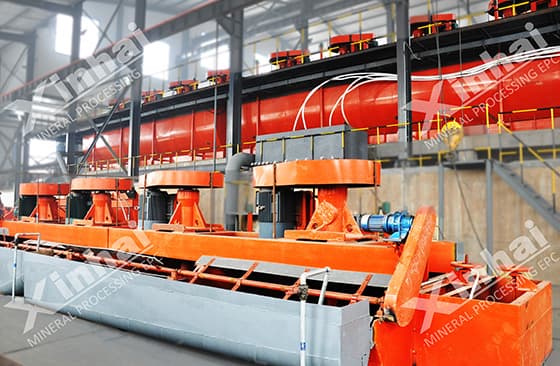
②Weak magnetic-strong magnetic process: this process uses weak magnetic separation to separate ores with weak magnetic properties, and uses strong magnetic separation to recover weak magnetic separation minerals from magnetic separation tailings, which is mainly suitable for processing mixed ores with low magnetic greenness.
③Weak magnetic field-strong magnetic field-flotation process: this method is often used for the separation of polymetallic symbiotic iron ores.
Thebeneficiation methods of hematite mainly include: roasting magnetic separation process, flotation process, weak magnetic-strong magnetic separation process, strong magnetic-flotation process.
Roasting and magnetic separation process: When the mineral composition is complex and the concentrate cannot be recovered well by other beneficiation methods, the magnetization roasting method is generally used.
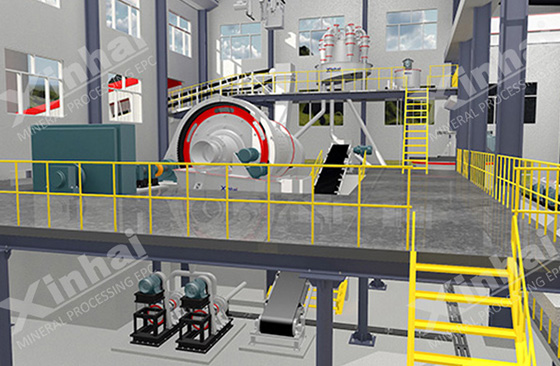
(1) Flotation sorting process
The flotation process of hematite can be divided into three categories: cation reverse flotation, anion positive flotation and anion reverse flotation. Flotation reagents can be oxidized paraffin soap, crude tall oil chlorinated acid, petroleum, sodium sulfonate, corn flour, etc.
(2) Weak magnetic field-strong magnetic separation process
This method is a traditional process for processing mixed ores of magnetite and hematite. The magnetic separation tailings are first concentrated, and then subjected to strong magnetic roughing and sweeping operations, and the obtained rough concentrates are concentrated and then selected.
(3) Strong magnetic-flotation process
Because hematite contains a small amount of magnetite, which is a strong magnetic mineral, it is easy to cause blockage of the high magnetic field magnetic separator. Therefore, it is necessary to add weak magnetic separation operations before the strong magnetic separation process to remove or sort out strong magnetic minerals. The selected coarse concentrate needs to be finely ground and flotation to produce qualified concentrate products.
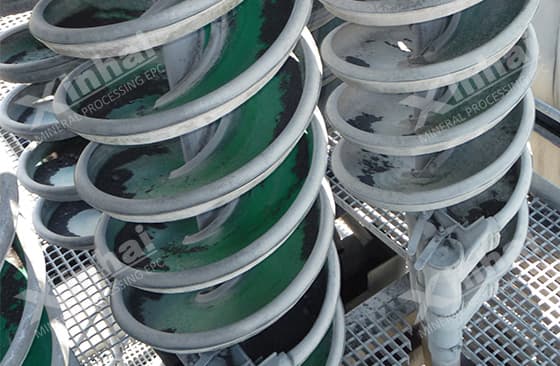
As a major iron mineral, limonite is formed by the weathering of other ores and is widely distributed. The beneficiation process of limonite mainly includes a single separation process and a joint separation process.
The single sorting process is generally used to process ores with high iron content and good selectivity, mainly including gravity separation, strong magnetic separation and flotation.
(1) Single Gavity process
Gravity separation is the main separation method of limonite, which is mainly used to deal with coarse-grained ore. The gravity separation processes used to process coarse-grained ores are: ore washing, jigging gravity separation and dense medium separation. To process fine-grained ore, spiral chute and shaker are generally used for gravity separation.
(2) Single magnetic separation process
Magnetic separation is a commonly used beneficiation method for limonite. Its process layout is simple, management is convenient, and it has strong adaptability to ore. The concentrate after magnetic separation is easy to concentrate and filter, and is generally suitable for coarse-grained ore slime, and the separation effect for fine-grained ore slime is poor.
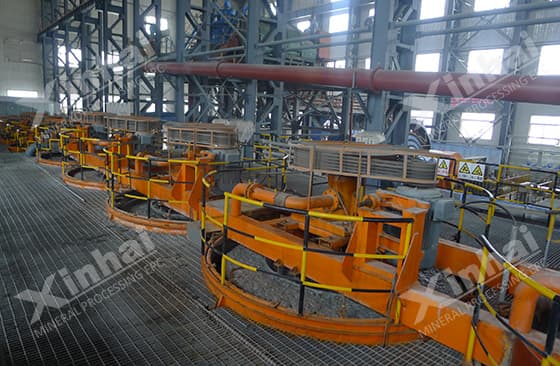
(3) Single flotation process
There are two types of single flotation process: positive flotation and reverse flotation. The forward flotation process is generally carried out under alkaline conditions, while the reverse flotation is to select the gangue minerals by sticking to the foam and leaving the iron-containing minerals in the flotation tank.
The combined sorting process mainly includes magnetization roasting-magnetic separation, flotation-strong magnetic separation, gravity separation-strong magnetic separation, etc., which can be selected according to the characteristics of the ore itself.
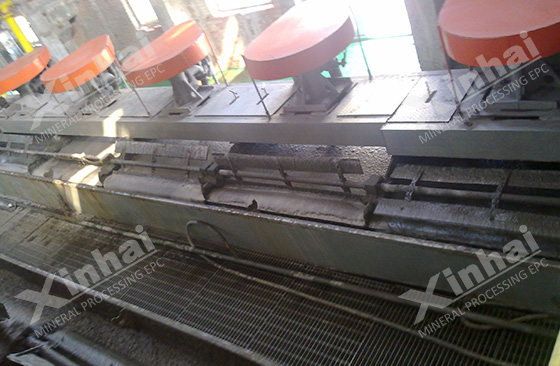
The above is a brief description of the beneficiation technology of magnetite, hematite and limonite. In actual production, the beneficiation plant will improve and adjust the beneficiation process according to the characteristics of the ore itself to obtain a higher concentrate recovery rate. Therefore, Xinhai Mining recommends to conduct a beneficiation test analysis on the raw ore before determining the beneficiation process. The test structure has an important basis for the design of the subsequent beneficiation process. Xinhai Mining can provide you with accurate iron ore beneficiation tests, customized iron ore beneficiation schemes, and efficient iron ore beneficiation equipment. If necessary, please leave a message for consultation.
To find out more about our products and solutions, please fill out the form below and one of our experts will get back to you shortly.